Relevant Overviews
- Content Strategy
- Online Strategy
- Online Community Management
- Social Media Strategy
- Content Creation & Marketing
- Online Architecture
- Digital Transformation
- Change & Project Management
- Thinking tools
- Personal Productivity
- Innovation Strategy
- Communications Tactics
- Psychology
- Social Web
- Media
- Politics
- Communications Strategy
- Science&Technology
- Business
Overview: Personal Productivity
There's so much out there written about personal productivity that it can be difficult to know where to start.
Most is what I call "productivity porn" - content created by and for people more interested in endlessly polishing and tweaking their "productivity stack" than actually using it. Some of the most successful content creators in this space, after obsessively developing highly sophisticated systems based around a particular combination of productivity tools, monetise it in the form of books and courses.
However there's a problem with this approach:
- each system has been painstakingly honed by the author for the author...
- ... but you're not the author, and - unfortunately - what works for them won't necessarily work for you
- moreover, trying to reverse engineer someone else's finely tuned system risks breaking it apart.
Personal Productivity Framework
You're better off developing your own - the question is how. The answer is to use a Framework - a way of thinking about personal productivity that helps each person find their own system, meeting their specific needs and preferences.
A lot of the content curated below went into my own personal productivity system, from which I've distilled a personal productivity framework which divides productivity into three pillars, with each pillar supporting the other two:
- time management: an “ideal day” ensures you work in synch with your brain’s ability to focus and ringfence your day’s Most Important Task, and carves out time for daily and weekly routines to support ..
- task management, which borrows liberally from Getting Things Done (GTD) and integrates it with …
- knowledge management: a content pipeline for managing everything from random thoughts to published content, and ensuring you get the most out of what you read.
I've written a fair bit about this myself (see what I think tagged #productivity), and recently boiled it all down to a short and inexpensive online course: Personal Productivity Framework.
Relevant resources

The open-plan office continues to doggedly spread, despite study after study suggesting it makes employees more miserable, more ill, less friendly and less productive... if a company is determined to inflict this woe on its workers, it should observe some basic rules...:
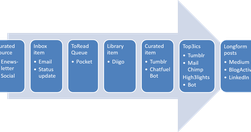
Whether you read, curate or create, you need to manage the content that matters to you if you want to extract maximum benefit from it.

waking up early has nothing to do with the alarm clock, but it has everything to do with these elements... Let’s go through one thing at the time.
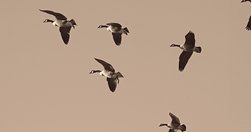
four “stages of control”: Preparation, Incubation, Illumination, and Verification... The unconscious mind “Incubates” the information collected, and finds connections that lead to “Illumination”... If you arrange your creative work according to these seven categories, you can ease creative insights through the four stages of control.
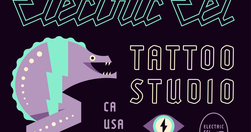
We may see ‘creativity’ as an individual trait... but real creativity depends on a community of likeminded people... what we call creativity is not the product of single individuals, but of social systems making judgements about individual’s products.... Brian Eno calls this community a ‘scenius’—a group of creative individuals who make up an ‘eco…

Scientists have conducted a fair bit of research on the factors that can make people more (or less) focused, productive, and creative.

for innovators who are tasked with problem solving and imagining the future, human curiosity and playfulness will always have the advantage.. . machines cannot yet have intuition, nor the ability to empathize, reframe problems and truly innovate.. . The robots may be coming for our jobs, but it is too early to call checkmate on human ingenuity.
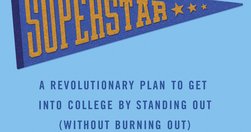
asking the following question of a given activity: will this add significant value to something I find to be significantly important to my life?... is this activity “the best” way to add value to this area of my life? ... focus on finding the small number of activities that offer the most such value... Many of the best uses of the online world s…

innovation is a series of steps, and that innovators possess certain characteristics... Almost everybody [has] innovative traits... the ability to think abstractly, having deep and broad knowledge, curiosity, openness to risk, grit, and dissatisfaction with the status quo... seek out experiences to put those traits to use

Many famous scientists have something in common—they didn’t work long hours... lives were full and memorable, their work was prodigious, and yet their days are also filled with downtime... great students didn’t just practice more than the average, they practiced more deliberately... engaging with full concentration in a special activity to improv…

“agile” describes so many different work systems that it’s become an almost meaningless term... for IBM “the leaders have to be with the squads [his word for small teams] and the squads have to be in a location.”... Research suggests remote workers are more productive and log more hours than employees who work in the office, and for many companie…

In today’s work environment, with multiple responsibilities and an abundance of sources of distractions, it is difficult to stay focussed. Here are some of the strategies that I’ve used successfully in my own work and in helping my clients be more productive.
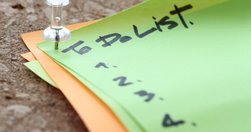
Bill Gates. At the end of each day, he would look at what he had worked on, and asked himself “what is on this list that somebody else could have done?”... we should be asking the following questions each day: What’s really important here? How am I using my gifts? What is my genius and how I can I bring it forth to impact my family, culture, a…

Journaling daily is the most potent and powerful keystone habit you can acquire. If done correctly, you will show up better in every area of your life ... We’ve become addicted to input... to reactively being guided by other people’s agendas... wakes up and immediately ... journal for 30 minutes... sleeping, his subconscious mind has been brewing…
employees have little faith in their leadership:22% of employees strongly agree the leadership of their organization has a clear direction for the organization.15% of employees strongly agree the leadership of their organization makes them enthusiastic about the future.13% of employees strongly agree the leadership of their organization communicat…
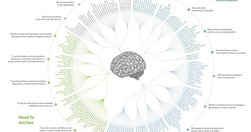
Yet another variation on the Top3ics format: exploring three facets of one topic, highlighting one outstanding resource (plus a few extra links) for each. Today’s theme... psychology

the deeper I went into my own work, the more I realized how my always-on, always-connected state had rendered me largely useless... The medium was no longer the message, it was just an asshole. I want my attention back...I could live on Twitter all day, everyday, convincing myself I was being productive. Or, at least inducing the chemicals in the …

A commonplace book is a central resource or depository for ideas, quotes, anecdotes, observations and information you come across during your life and didactic pursuits. The purpose of the book is to record and organize these gems for later use in your life, in your business, in your writing, speaking or whatever it is that you do.
Many of the world's busiest leaders "have set aside at least an hour a day for ... deliberate practice or learning... share my personal deliberate learning practice that I've developed so far... an Evernote doc each month and recording everything I read that I want to ingest. Then at the end of the month, I scan back over what I recorded ... think…
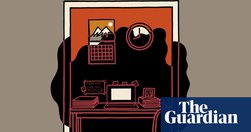
All of our efforts to be more productive backfire – and only make us feel even busier and more stressed ... if the stream of incoming emails is endless, Inbox Zero can never bring liberation: you’re still Sisyphus, rolling his boulder up that hill for all eternity – you’re just rolling it slightly faster... if you are among the growing ranks of t…

a fascinating inquiry into how our subjective experience of time’s passage shapes everything from our emotional memory to our sense of self....the disorienting sense that time isn’t something which happens to us — rather, we are time.... Distracted by the obligations of everyday activities, we are no longer aware of ourselves…... loss of contact …
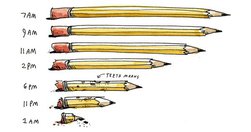
cognitive psychologist Ronald T. Kellogg explores how work schedules, behavioral rituals, and writing environments affect the amount of time invested in trying to write and the degree to which that time is spent in a state of boredom, anxiety, or creative flow... High-intensity noise that exceeds 95 decibels disrupts performance on complex tasks b…
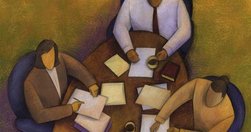
One of the primary reasons to get teams together has to do with the hardwiring of the human brain... Building trust is a multisensory experience... Only when people are physically present together can they use all of their senses to establish that needed trust. Without a bond, conflict or disengagement can more easily arise and is more difficult t…
Robert Putnam -- famous for "Bowling Alone," ... found that the greater the diversity in a community, the fewer people vote and the less they volunteer, the less they give to charity and work on community projects.... virtually all measures of civic health are lower in more diverse settings... "Diversity... seems to bring out the turtle in all of …

a lot of people don’t know fake news when they see it, sensationalized reports are more likely to go viral on social media than sane ones, and distrust of traditional (and genuinely more reliable) media sources is rising. Professor Nicole A. Cooke ... focusing on human information behavior, information literacy, and diversity in librarianship.... …
Today I have just one Topic: Quit Social Media. Your Career May Depend on It. This advice, from Professor Cal Newport in the New York Times, may seem counter-intuitive. Which is exactly the point.
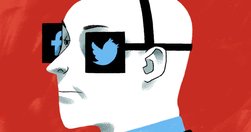
the market rewards things that are rare and valuable. Social media use is decidedly not ... Any 16-year-old with a smartphone can invent a hashtag ... The idea that if you engage in enough of this low-value activity, it will somehow add up to something of high value in your career is dubious ... snake oil and flimflam... why not also expose your…
Let’s take a break from the Donald, Facebook and the end of democracy, and try to focus on what’s important.

We all have the same number of hours in the day.... Some find the time to be strategic, while others spend their whole time fire-fighting... here are 32 small changes you can make which will find you the time you need. 14. Set a time limit for everything Many tasks grow to fill the available time. You can spend weeks agonising over a design if y…
Relevant Overviews
- Content Strategy
- Online Strategy
- Online Community Management
- Social Media Strategy
- Content Creation & Marketing
- Online Architecture
- Digital Transformation
- Change & Project Management
- Thinking tools
- Personal Productivity
- Innovation Strategy
- Communications Tactics
- Psychology
- Social Web
- Media
- Politics
- Communications Strategy
- Science&Technology
- Business
